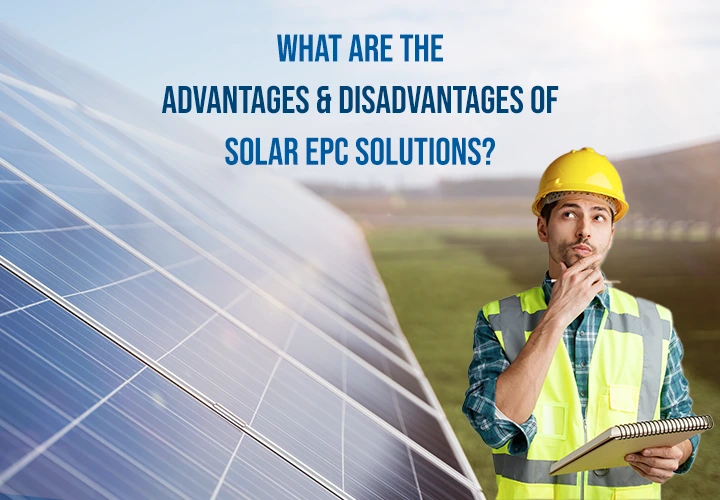
What are the Advantages and Disadvantages of Solar EPC Solutions?
Introduction
For new homeowners and businesses seeking sustainable energy alternatives, solar EPC solutions offer a smart and reliable way to harness renewable power. With numerous Solar Industry Companies in India providing advanced technologies, choosing the right solar EPC solutions can be overwhelming. From designing and procuring equipment to installing and maintaining solar power systems, these turnkey solutions ensure efficiency and long-term energy savings. This article explores the key advantages and disadvantages of solar EPC solutions, helping you make an informed decision for a greener future
Solar EPC solutions
Solar EPC (Engineering, Procurement, and Construction) solutions allow for a single contractor to handle all aspects of solar energy project management. From the first design stage to the material acquisition to the last construction and commissioning, this method guarantees efficient execution. By consolidating these procedures, Solar EPC solutions seek to maximize project effectiveness, cut expenses, and preserve constant quality while offering customers a streamlined and dependable route to solar energy collection.
-
End-to-end project transparency ensures clear timelines, budgets, and deliverables, building customer trust.
-
Access to the latest solar technology and expert teams guarantees higher efficiency and long-term system reliability.
-
Faster execution under a single contractor avoids delays and ensures timely project completion.
-
Cost efficiency with better ROI, as EPC providers optimize design and procurement to reduce expenses and maximize returns over time
Advantages of Solar EPC solutions
- Renewable Source of Energy: Solar power is a renewable source of energy as the sunlight is unlimited. It is easily accessible to people throughout the year, barring a few cloudy days. The bottomless, readily available energy is yet to be tapped into by most.
- Reduced Electricity Bill: As you will be producing your house’s energy needs, the difference will be reflected by the drastic drop in your electricity expenses. If the energy produced is greater than the required amount, you may sell it back to the grid as well.
- Lower Maintenance Cost: Most solar panels come with a warranty of 20-25 years, considering that it is cleaned a couple of times a year. As it does not have any moving parts, maintenance is relatively easier and less expensive.
- Generates Energy in Any Climate: Apart from cloudy days, the climate does not have much effect on the total output. In fact, cold and snow might improve power production as it clean the panels as it melts.
- Increased Property Value: It is a great investment for homeowners as it increases the property value owing to factors like energy self-sufficiency and reduced electricity bills.
Disadvantages of Solar EPC Solution
- High Installation Costs: Most customers view the installation as a headache as it ensues high bills. But with Leading Solar EPC Solution Provider like us, this issue is gradually declining.
- Roof Limitations: Roofs facing the sun at an angle are better equipped to receive sunlight for maximum production. Alongside, it requires proper building materials and space for installation.
- Dependent on Sunlight: As mentioned earlier, energy production with solar systems relies on the presence of sunlight. If your area has stormy or rainy weather, then solar power might not be the best option.
- Expensive Storage Solar Energy: With recent technological advancements, the aforementioned issue can also be fixed. Though expensive, excess energy can be stored in external batteries and used during power outages, cloudy days or at night time.
- Space Requirement: Large-scale solar EPC projects often need significant land or roof space, which may not be feasible in dense urban areas.
- Maintenance Needs: Though minimal, solar panels and inverters require periodic cleaning and servicing to maintain peak performance.
- Initial Approval & Permits: Solar EPC projects sometimes face delays due to government approvals, net metering policies, or utility regulations.
-
Energy Transmission Losses: If not designed properly, transmission from panels to the grid or storage system can result in small energy losses.
Conclusion
Considering the pros and cons, it can be concluded that successful solar solutions are completely situational. The feasibility of the option can change depending on multiple factors like your house materials, local weather, budget and commitment. Despite that, most customers choose the best Solar Engineering Company for a green and reliable solution to their energy needs. When considering the varied options offered by Solar EPC Company India, it is important to keep in mind your power requirements and budget. Contact us for further information today!
FAQ on Solar EPC Solutions
1. What is the biggest disadvantage of Solar EPC solutions?
The high installation cost is considered the main disadvantage.
2. Do Solar EPC projects need a lot of space?
Yes, large projects require big rooftops or open land for installation.
3. Are Solar EPC systems dependent on weather?
Yes, solar power relies on sunlight, so production drops during cloudy or rainy days.
4. Is maintenance required for Solar EPC systems?
Minimal maintenance like panel cleaning and inverter checks is needed.
5. Can approvals delay Solar EPC projects?
Yes, government permits and net metering approvals may cause delays.

